CMI celebrates its 20th anniversary: Strong international cooperation and joint efforts needed to achieve peace
CMI marked its 20th anniversary with an international webinar bringing together high-level international politicians, researchers and practitioners to discuss the current and future challenges of peacemaking. The event also remembered and honoured CMI’s former Executive Director Tuija Talvitie, who passed away in January this year.
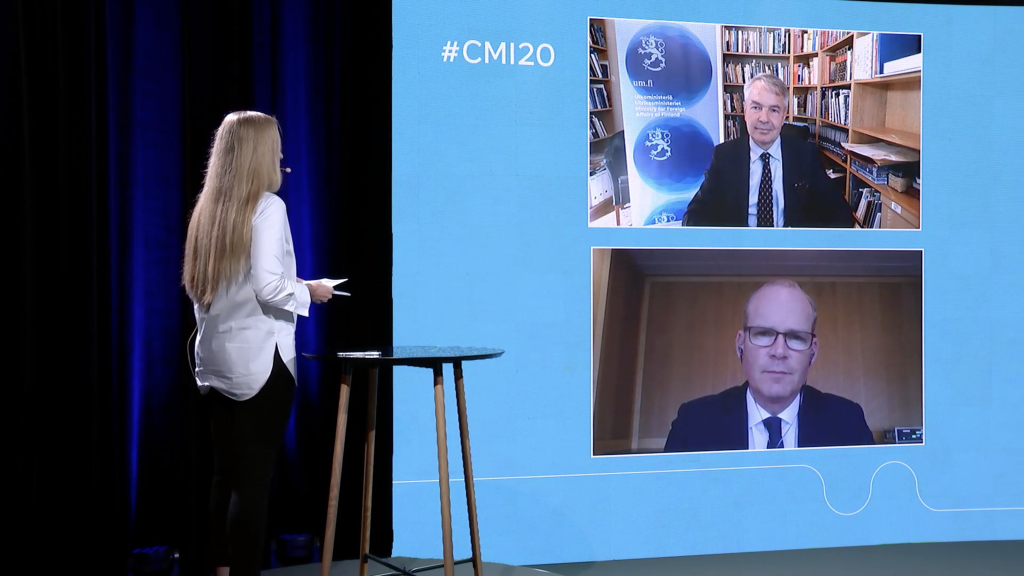
Journalist Annika Damström interviews Foreign Minister of Finland Pekka Haavisto and Foreign and Defence Minister of Ireland Simon Coveney.
“President Martti Ahtisaari founded CMI because he believed that all conflicts can be resolved. That is our vision.” CMI’s Chair of the Board Alexander Stubb started the webinar by giving welcoming remarks on behalf of CMI’s board.
The webinar’s moderator, journalist Annika Damström, continued by inviting Finland’s Minister for Foreign Affairs, Pekka Haavisto, to speak. He was joined by Simon Coveney, Minister for Foreign Affairs and Minister for Defence of Ireland. Sweden’s Minister for Foreign Affairs, Ann Linde, sent her greetings to the participants via video.
Finland, Ireland and Sweden are longstanding CMI partners and donors. These countries are small, but especially active in peacemaking.
It is important that, with respect to many conflict regions, Finland is not burdened by having a colonial history. Finland’s own challenging history can also inspire others. Finland has its own past experiences of war and conflict, but has still been able to build sustainable peace in the country, Haavisto told the participants. Being an independent, Finnish organisation gives also CMI the space to act.
Simon Coveney emphasised the importance of well-functioning multilateralism to uphold peace in the world. “It is vital that at a time, when multilateralism is being deliberately undermined by some, we work together to defend this system, that despite its faults, has protected the world from catastrophic global conflict”, he said. Small countries can set an example in this.
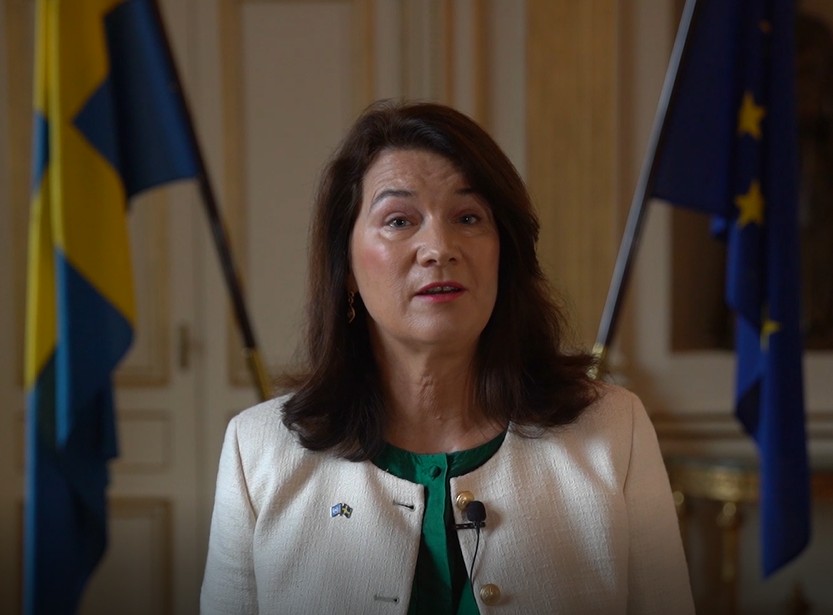
Minister for Foreign Affairs of Sweden, Ann Linde.
All the ministers reinforced their support for CMI’s work, and commended the partnership. Ann Linde said, “CMI has become a significant and trusted partner in many of the most difficult and complex conflicts of our time.”
“It takes not only leadership and political will, but also trust, inclusion and long-term commitment to achieve peace”, she added.
“We need leaders who are ready to walk the talk “
Be flexible, react better, be better at using the existing tools, and communicate and coordinate more. This is how Roxana Cristescu, CMI’s Director, European Affairs and Head, Eurasia summed up the recommendations for the peacemaking community by a second panel. She moderated a discussion between Ambassador Thomas Greminger, Former Secretary General of the OSCE; Ambassador Jeffrey Feltman, former UN Under-Secretary-General; and Her Excellency Dr Speciosa Wandira Kazibwe, Former Vice President of Uganda.
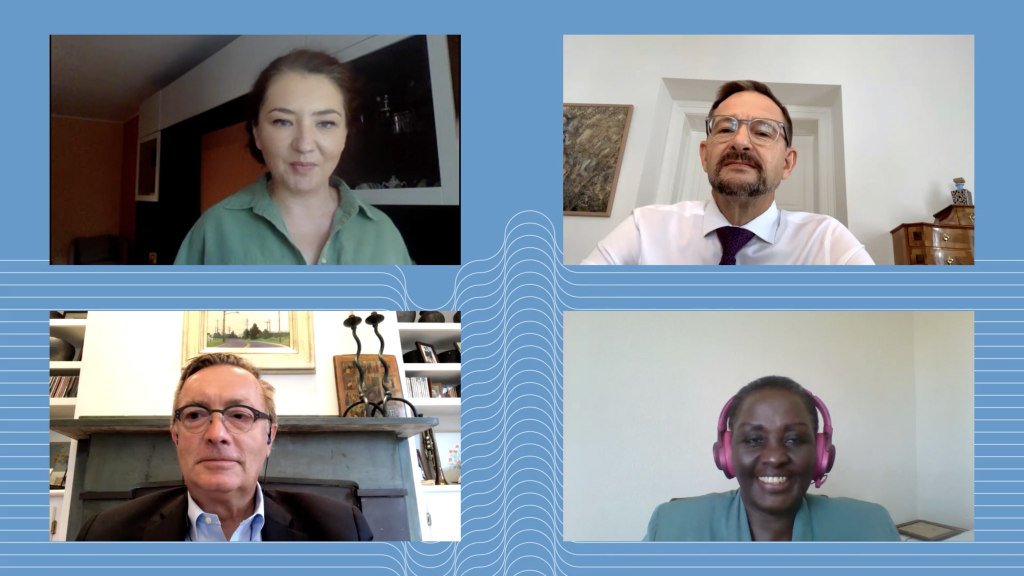
Roxana Cristescu, CMI’s Director, European Affairs & Head, Eurasia, moderating a discussion with Ambassador Thomas Greminger, Ambassador Jeffrey Feltman and
H.E. Dr. Speciosa Wandira Kazibwe.
“We need more political leaders who understand and support the value of multilateralism, we need leaders who are ready to walk the talk”, Ambassador Greminger said. Ambassador Feltman continued with a call for more cooperation and communication between different peacemaking actors. “Nobody has a monopoly on wisdom or influence on those that have the power to start or end a conflict”, Feltman said.
Dr. Wandira Kazibwe highlighted the importance of the inclusion of women. “The resilience of women is remarkable. In Africa we have seen women in the forefront of mitigating the effect of the Covid-19 pandemic”.
Peace mediation in 2020 – easier said than done?
The webinar continued with a discussion on the current and future trends for peace mediation. Annika Damström invited Rina Amiri, Senior Fellow, Center for Global Affairs, New York University; Dr. João Gomes Porto, Advisor, CMI; Scott M. Weber, President of Interpeace; and Kai Sauer, Under-Secretary of State, Foreign and Security Policy, Ministry for Foreign Affairs of Finland to join the discussion.
The pandemic is making conflict and conflict-prone countries even more fragile, generating old and new tensions. Concerning the current challenges, Gomes Porto noted that “the pandemic has exposed many fractures in our systems”.
“In the current circumstances, it takes a lot of creativity, flexibility and inter-agency cooperation to create conditions for peace mediation”, said Kai Sauer.
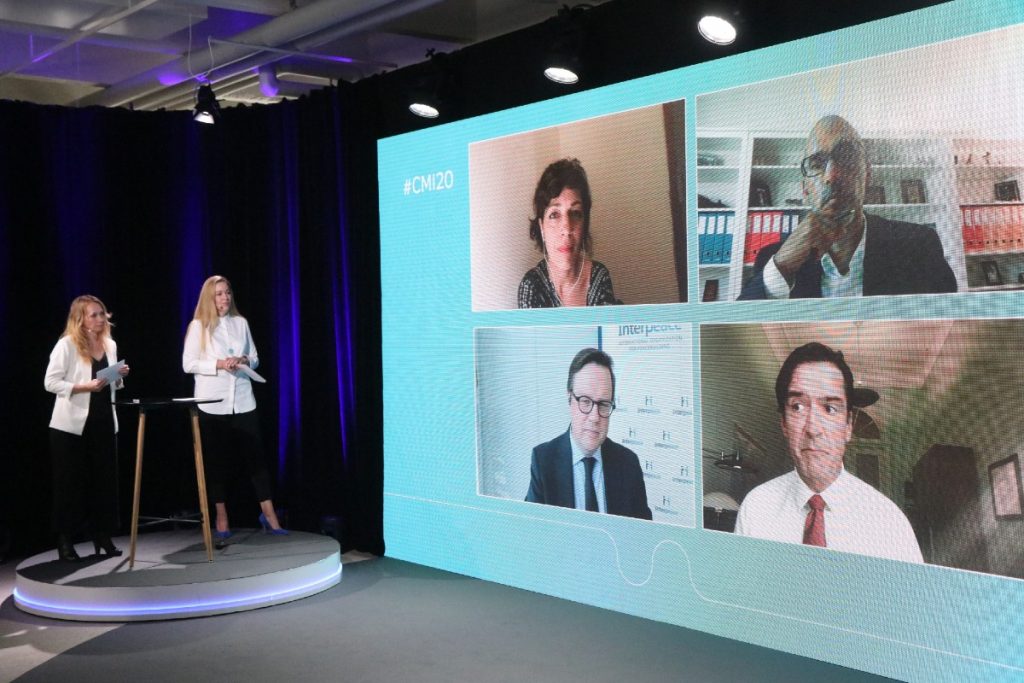
CMI’s Head of Women in Peacemaking, Johanna Poutanen (on the left) asking the panelists a question.
Despite the devastating effect the pandemic has had on the world, it has also made it possible for digitalisation to enter spheres where it was not properly present before.
“Even with all the challenges, the digital world has also enabled us to move things forward. Digital technology and its role in peace mediation used to be very siloed and specialised, but since the pandemic we have thrusted to the digital age and every peace process has a digital component now”, said Rina Amiri.
Digitalisation has in many ways broadened the space and also added cooperation between the international and local level. Scott Weber welcomes this change. “Organisations like CMI and Interpeace need to look more at local based models, rather than just international intervention based models”, he said.
The Covid-19 sheds light on the importance of building resilient societies that can withstand crisis, Weber said. The question is how people can work together to solve different problems.
Peace is a question of will
The event ended with a tribute to CMI’s former Executive Director Tuija Talvitie, who passed away in January this year. The audience got to hear “Peace is a Question of will”, a song by the Finnish actor and musician Irina Björklund and the folk group Pauanne. Björklund drew inspiration from President Martti Ahtisaari’s Nobel Peace Prize acceptance speech and wrote a beautiful song based on it.
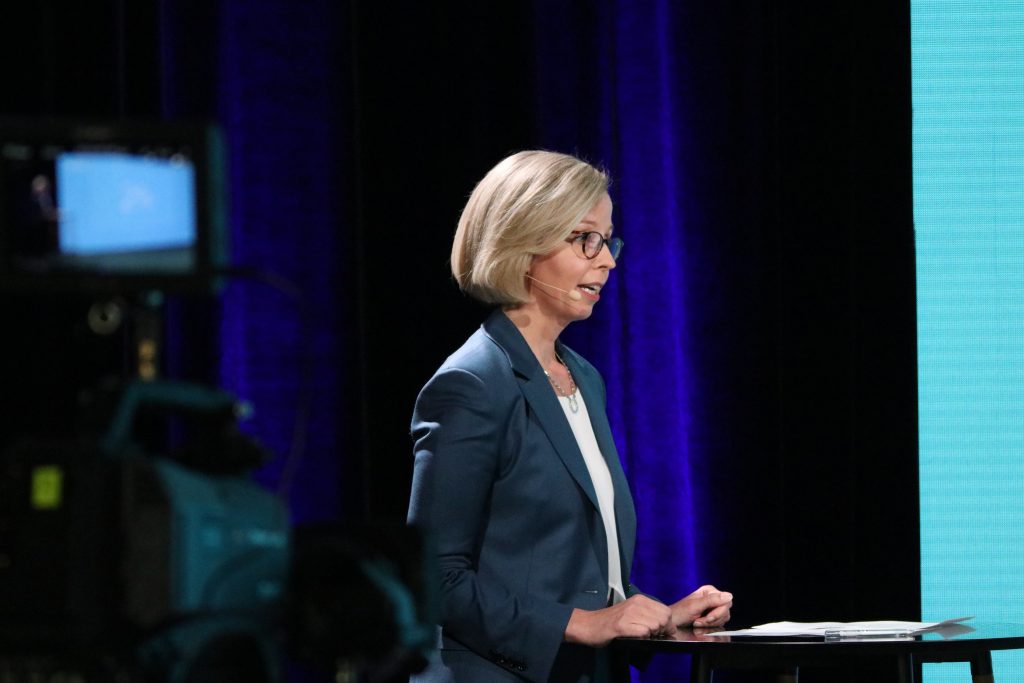
CMI’s Acting Executive Director Hanna Klinge.
Hanna Klinge, Acting Executive Director of CMI, said in a tribute to Tuija that her “vision has profoundly affected the way CMI has worked”.
When Tuija joined CMI, the organisation had only 17 members of staff. Under her leadership, CMI grew to be an organisation of almost 100 experts working all over the world. She played an important role in strengthening the role of women in peace processes as a key priority for CMI and exploring the use of technology in peacemaking as a key area of development within the organization.
“We will carry her wisdom and curiosity with us to the next decades of peacemaking”, said Klinge.
Recording of the webinar can be found here.